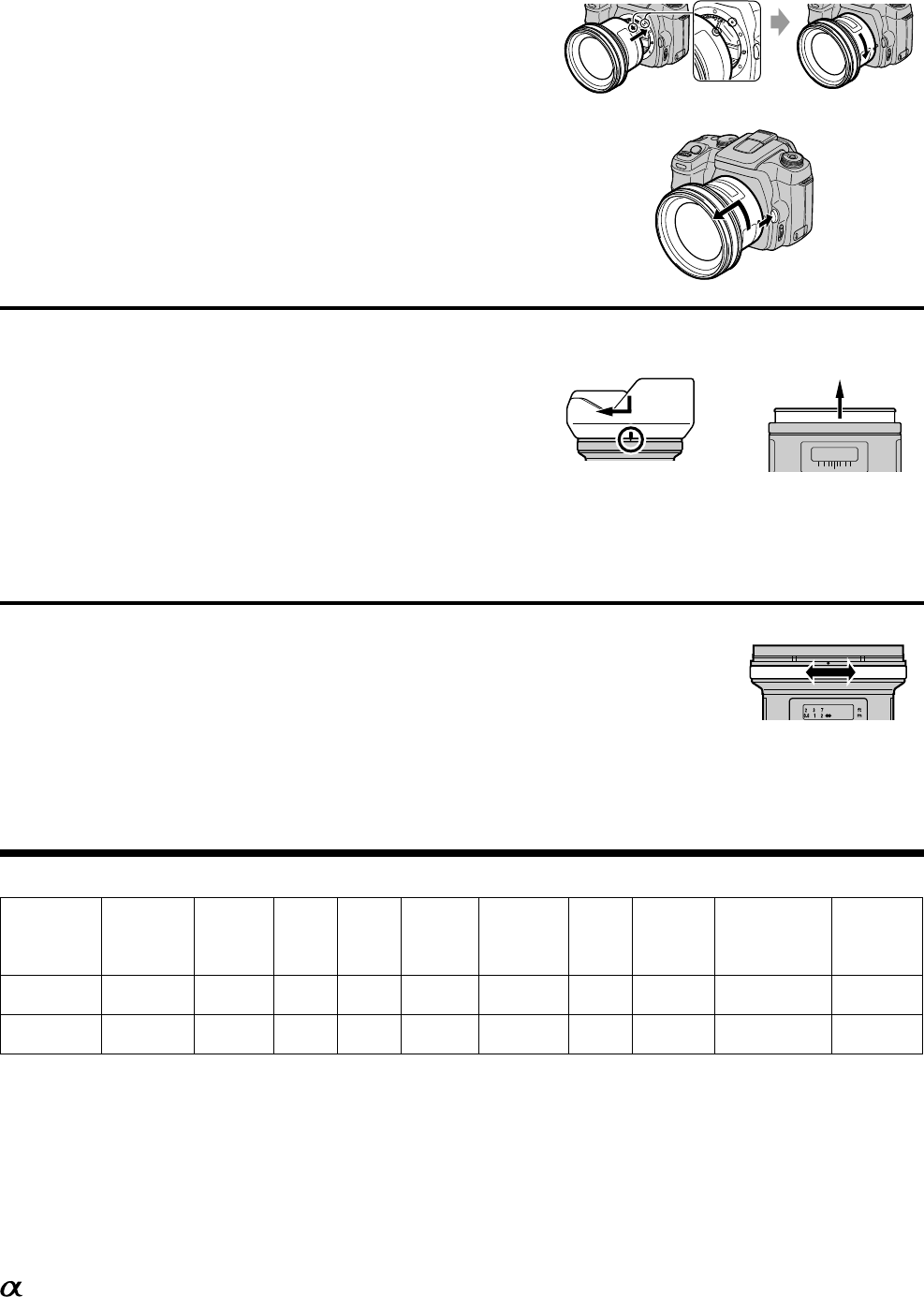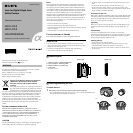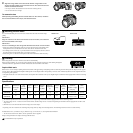
20mm F2.8: 28mm F2.8:
22
0.3 0.35
0
1.21
2216 168 844
ft
m
2 Align the orange index on the lens barrel with the orange index on the
camera (mounting index), then insert the lens into the camera mount and
rotate it clockwise until it locks.
• Do not press the lens release button on the camera when mounting the lens.
• Do not mount the lens at an angle.
To remove the lens
While pressing and holding the lens release button on the camera, rotate the
lens counterclockwise until it stops, then detach the lens.
Attaching the lens hood
It is recommended that you use a lens hood to reduce flare and ensure maximum image
quality.
20mm F2.8:
Align the red line on the lens hood with the red dot on the lens, and rotate the
lens hood clockwise until it stops.
28mm F2.8:
Focus on something at close range and extend the lens hood out from the lens.
• When using a built-in camera flash, make sure to remove the lens hood to avoid blockage of the
flash light. For the lens with the built-in lens hood, retract the lens hood back into the lens.
• If a marking (red line, red dot, etc.) is provided, attach the lens hood properly. Otherwise, the lens
hood may interfere with the desired effect or may appear in pictures.
• When storing, turn over the lens hood and place it onto the lens backwards. (20mm F2.8 only)
Focusing
When using the auto focus, the camera focuses the lens automatically.
When focusing manually, set your camera to the manual focus and rotate the focusing ring while looking through the
viewfinder. The focus signal in the viewfinder indicates the current condition of the focus.
Depth-of-field scale
When focus is set on a subject, anything at that same distance will appear sharp, and anything within a certain range before and beyond the subject will also appear
in focus; this is called depth of field. Depth of field depends on the subject distance and aperture you choose and is indicated by the lines on the depth-of-field scale
corresponding to the aperture.
• The depth-of-field scale is for 35mm-format cameras. The depth-of-field is shallower when you use Digital Single Lens Reflex Cameras equipped with an APS-C sized image
sensor.
Specifications
Name
(Model name)
Equivalent
35mm-format
focal length*
1
(mm)
Lens
groups-
elements
Angle of
view 1*
2
Angle of
view 2*
2
Minimum
focus*
3
(m (feet))
Maximum
magnification
(×)
Minimum
f-stop
Filter
diameter
(mm)
Dimensions
(maximum
diameter × height)
(mm (in.))
Mass
(g (oz.))
20mm F2.8
(SAL20F28)
30 9-10 94° 70° 0.25 (0.8) 0.13 f/22 72
Approx. 78×53.5
(3 1/16×2 1/8)
Approx. 285
(10 1/16)
28mm F2.8
(SAL28F28)
42 5-5 75° 54° 0.3 (1) 0.13 f/22 49
Approx. 65.5×42.5
(2 9/16×1 11/16)
Approx. 185
(6 1/2)
*
1
The value for equivalent 35mm-format focal length is based on Digital Single Lens Reflex Cameras equipped with an APS-C sized image sensor.
*
2
The value of angle of view 1 is based on 35mm-format cameras, and that of angle of view 2 is based on Digital Single Lens Reflex Cameras equipped with an APS-C sized
image sensor.
*
3
Minimum focus is the shortest distance from the image sensor to the subject.
• Depending on the lens mechanism, the focal length may change with any change of the shooting distance. The focal length assumes the lens is focused at infinity.
Included items: Lens (1), Front lens cap (1), Rear lens cap (1), Lens hood* (1), Set of printed documentation
* The lens hood of 28mm F2.8 is built-in, and no separate lens hood is supplied.
Designs and specifications are subject to change without notice.
is a trademark of Sony Corporation.




